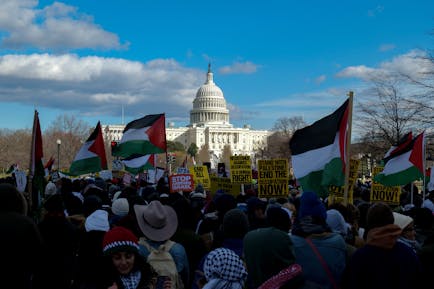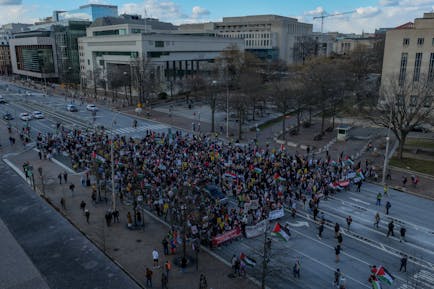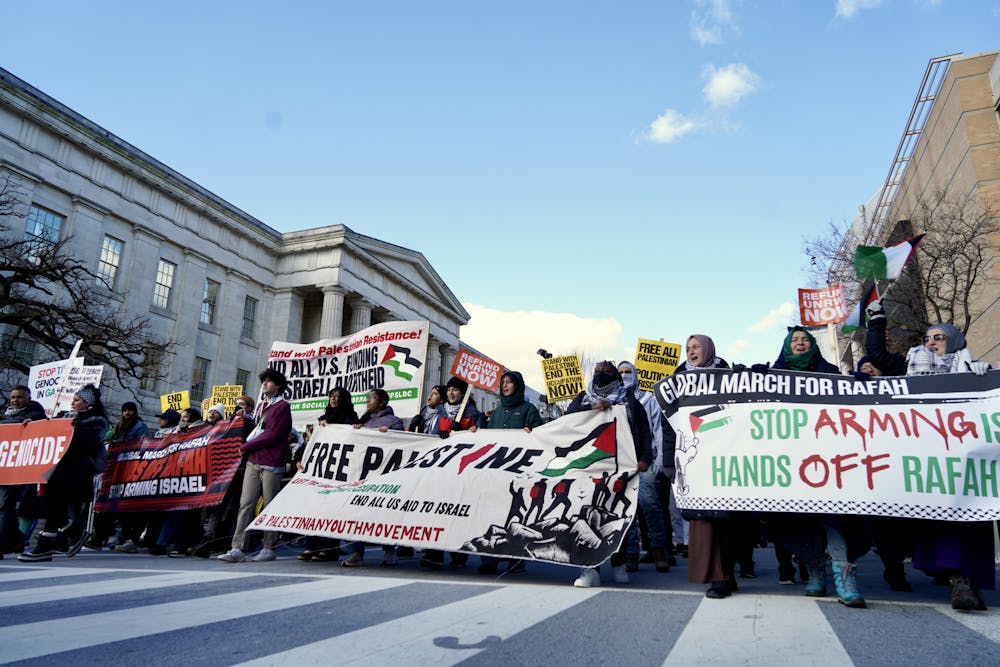Hundreds of demonstrators gathered outside the Gallery Place-Chinatown Metro Station to join a global march for Rafah on Feb. 17. Organizers called for an immediate arms embargo on Israel and a reinstatement of funding to the United Nations Relief and Works Agency for Palestine Refugees in the Near East.
After over 100 days of the Israel-Hamas war, Israeli President Benjamin Netanyahu ordered an evacuation of Rafah on Feb. 9, a city on the southernmost tip of the Gaza Strip. Within Rafah, roughly 1.5 million Palestinian citizens are displaced, leaving the city the most densely populated place on Earth.
Egypt, which shares the Gaza Strip’s southern border, has previously rejected influxes of refugees from Palestine. Critics of Netanyahu’s evacuation order say it effectively trapped refugees in Rafah.
A media spokesperson from the D.C. chapter of the Palestinian Youth Movement who spoke to the Eagle said, “[The assault on Rafah] illustrates that this is the final stage of an attempt to ethnically cleanse Palestinians.”
The organizers

The Palestinian Youth Movement partnered with Maryland 2 Palestine, the Party for Socialism and Liberation and Doctors Against Genocide for the protest.
The demonstration began outside the Gallery Place-Chinatown station where organizers passed out signs to protesters and led the crowd in a series of chants. Participants chanted in both Arabic and English and organizers had sign language interpreters that translated both.
Leaders of the demonstration engaged the crowd in call-and-response chants that criticized the American government, demanded justice and advocated for a ceasefire in Gaza, as in “Israel bombs, U.S.A. pays. How many kids did you kill today?”
Many attendees wore masks and declined to share their full names with The Eagle, and speakers often shared only their first name and their organization.
The first speaker introduced themself as an organizer with the Palestinian Youth Movement and condemned the assault on Gaza in the last 133 days.
Elizabeth Bergner, who is originally from Illinois but is currently living in D.C., said this was her first protest supporting the cause.
“I just don’t believe in the violence, starvation and occupation of Palestine,” Bergner said. “I myself am Jewish, and I think, like many other Jews, I don’t want this done in my name.”
‘We remember all our martyrs; all our parents, sons and daughters.’
Esmé Lee, a freshman in the School of Communication, attended the protest to “hear the perspectives of Palestinian people and people that are involved.”
Lee said she felt uneasy about the desensitization of the conflict on social media. “When I get the chance to go to protests or go to talks, it feels a lot more real,” said Lee. “I think it’s important that people show up.”
Lee hoped the protest would raise awareness, especially from the government. Rather than simply emphasizing what those who agree or disagree with the movement say, Lee felt a display of dedication was more important.
“It’s about making sure the government knows people care. It’s not just going to stop happening; they’re not just going to disappear,” Lee said.

The protest organizers shared the same sentiment as Lee as they encouraged the crowd to remember Palestine’s martyrs.
Speakers instructed the crowd to find a copy online of Islamic University in Gaza professor Refaat Alareer’s poem “If I Must Die” and to join them in reading it aloud. Alareer was killed in an Israeli airstrike on Dec. 6, and his poem says that if he is to die, his death must not be in vain.
Alareer concludes the poem by stating “If I must die / let it bring hope / let it be a tale.”
Calls for global resistance
Sean Blackmon, a member of the Party for Socialism and Liberation who spoke to the crowd, said there was no place he would rather be than in the streets to stand in solidarity with the people of Palestine.
“No matter what lies apartheid Israel tells, no matter what lies the imperialist United States tells that support apartheid Israel, the reality of the inhumanity of the genocide against Palestine is painstakingly clear,” Blackmon said.
Blackmon said it was necessary to spread anti-imperialism across the globe, and spoke about colonialism in Africa, referencing imperialist struggles in both Mali and Burkina Faso. As he spoke to the crowd, Blackmon said it was “our responsibility for us to help finally close the lid and put the nail on the coffin of U.S. imperialism.”
“When we see the ongoing intensity and tenacity of the Palestinian resistance, this is what invigorates our movement here in the U.S. and all over the world,” Blackmon said. “When we see that brave resistance, and when we see the attempts of apartheid Israel and the imperialist U.S. to try to crush that resistance and to try to crush our solidarity, this is what shakes something within us.”
The protesters
Protesters hailed from diverse national and international origins. Nayla Azarbeygui Rayyahnza, who is originally from Lebanon, said she’s been showing her support for Palestine for 54 years.
“I think it’s important for everyone to take a stand against what’s going on,” she said. “It’s terrible. And people need to wake up and realize that the West is controlling the narrative.”
Shi Han, a protestor with the Party for Socialism and Liberation, said, “We’re here to take a stand against our government’s funding of the Israeli apartheid machine and we’re supporting the Palestinian resistance.”
“We demand that this money, instead of being put towards the military, being put towards bombs that kill children, it gets put towards health care, towards education, towards things that actually help the people,” Han said.

Calls for aid
Some speakers drew attention to the health crisis in Gaza. One speaker, who did not share her full name, was a member of Doctors Against Genocide. She had just returned from working as a nurse in Gaza. She shared her experiences, calling for the U.S. government to demand a permanent ceasefire, facilitate access to proper medical care and reinstate funding to the UNRWA.
Out of 36 hospitals in Gaza before Oct. 7, only 11 are now partially functioning. The World Health Organization found that airstrikes and a lack of medical supplies in the Gaza Strip have depleted an already struggling healthcare system.
The UNRWA was established in 1949 and works to provide Palestinian refugees with humanitarian aid, education, infrastructure, emergency response, health and social services, according to their website.
After allegations from Israel that some staff of the UNRWA participated in the Oct. 7 Hamas attacks, nine major donors paused funding to the Agency, including the U.S., Germany, Switzerland, Canada, the Netherlands, Australia, the United Kingdom, Italy and Finland. The UNRWA is historically the largest humanitarian actor in Gaza.
Reaching the Capitol
Despite Capitol police creating a barricade to prevent protestors from reaching the steps of the Capitol, speakers did not cease to voice their demands. They chanted, “Move cops, get out of the way. We know you’re Israeli-trained.”
A representative of Students for Socialism DMV spoke to the crowd to voice her concerns about funding from the government, providing a student perspective that referenced rising tuition costs.
As the march continued to grow closer to the police, protesters voiced their feelings of unrest towards the barricade. Organizers in orange and yellow vests reminded those closest to the police and the sole counter-protester to not engage.
A speaker from Students for Justice in Palestine addressed concerns about discrimination on college campuses as a representative of SJP members from Georgetown University, George Washington University, George Mason University, University of Maryland, University of Maryland Baltimore County and American University.
The speaker told the crowd to not lose sight of the bigger picture as they continue the fight for divestment. They urged listeners to promise to do everything for liberation and for the people of Palestine. Naming various professions like doctors, lawyers, and journalists, the speaker pushed the crowd to give everything back to Palestine.
The demonstration ended as protestors directly referenced Congress in their demands. They chanted, “Congress, Congress, you can’t hide. We charge you with genocide.”
This article was edited by Abigail Hatting, Zoe Bell, Abigail Turner and Abigail Pritchard. Copy editing done by Luna Jinks, Isabelle Kravis and Ariana Kavoossi.





